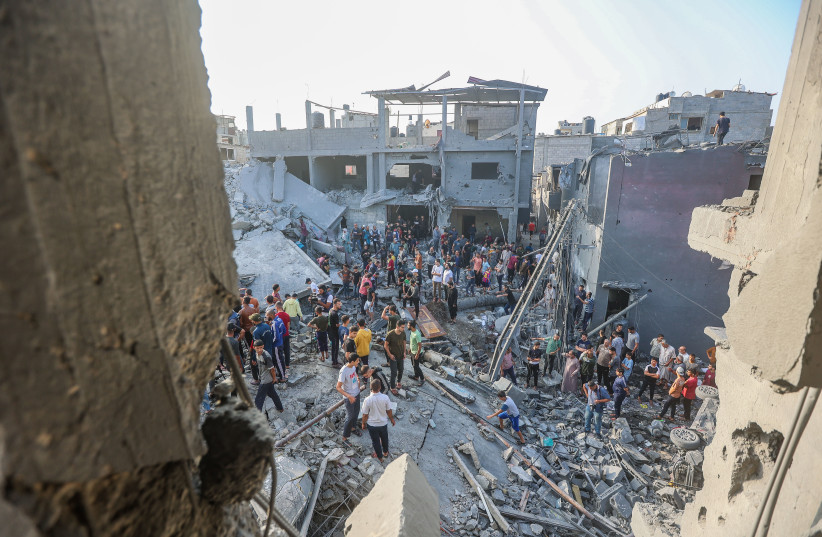Israel at crossroads: How will loss of 21 soldiers impact war strategy?
Israel was already at a crossroads about what to do about Gaza.
Should it push to cut a deal to return the remaining approximate 130 hostages as soon as possible, even at the high cost of not finishing off Hamas, or should it hold out for dismantling Hamas, even at the cost of additional risk to the hostages, while still trying to seek another partial hostage return for temporary ceasefire deal?
The death of 21 soldiers, all in one incident, only a couple weeks after another single incident in which large numbers of soldiers were killed, has brought even heavier scrutiny to this decision. It temporarily gives those wanting a deal that returns the hostages and ends the war, even if Hamas is not dismantled, the upper hand in the debate.
Even before this incident, National Unity Party top leaders and war cabinet members Benny Gantz and Gadi Eisenkot, Opposition Leader Yair Lapid, and a growing movement of hostage families have been pushing harder than ever for a deal to return all of the hostages, even if it falls short of completely dismantling Hamas.
Those in favor of this view cite a moral obligation to return, especially Israeli civilians from the South – an area not even in legal dispute like Judea and Samaria – regardless of the broader risk to the nation in the future.

They say that the country and the IDF “failed” these civilians and must restore them to safety before any other national interest is considered.
Another argument from officials on this side of the debate is the growing number of IDF losses, with it being unclear whether Israel will achieve anything new by continuing to fight.
Top defense officials have made it clear that, to date, they were ordered by the political echelon never to fire on areas where they knew there were Israeli hostages, even if that meant letting Hamas terrorists temporarily flee.
Limited rules of engagement make destroying Hamas more challenging
If such limited rules of engagement mean that Israel cannot kill Hamas’s top leadership, then, say, those who want a hostage deal even at a high cost, Israel can no longer really achieve much more strategically than it already has.
It has control over northern Gaza and will soon have control over central Gaza and most of Khan Yunis above the ground – what else would be left?
If that is true, then allowing the number of soldiers who die in Gaza to jump from 150 to 200 to 300, to maybe eventually 500, will be wasting hundreds of lives for no clear strategic purpose.
Watching 21 soldiers die in a single incident appears to significantly strengthen this argument and raise concerns that the number of dead IDF soldiers could multiply exponentially at this stage when the IDF has a smaller footprint and is becoming more static in its Gaza movements.
But this should not surprise anyone.
Though until now, the IDF faced greater resistance from Hamas in an organized way, which could be a greater risk, the amount of power the IDF was using and its constant maneuvering ironically meant that it was having fewer casualties.
In contrast, now that the IDF forces in large portions of Gaza have no obvious Hamas forces to fight, they are taking up more static defensive positions.
This makes them much easier to pick off in addition to reduced offensive power, which is being transferred to southern Gaza or other fronts.
Further, Gantz came out strongly on Tuesday, in lockstep with Prime Minister Benjamin Netanyahu and Defense Minister Yoav Gallant, that the IDF must continue the war for an extended period.
Lapid did not mention slowing the war but rather just expressed sadness at the loss of the reservists.
Surprisingly, there were almost no loud influential voices who tried to use the opportunity to push for a quick deal and IDF withdrawal from Gaza.
This is not because Gantz, Lapid, and others have become more anti-deal by the loss of 21 more soldiers, something which supports their arguments.
Rather, it is likely a temporary tactical move.
Taking advantage of the 21 dead soldiers to call for rushing a hostage deal or withdrawing from Gaza would be viewed even by supporters as insensitive and bad form at this moment.
Also, right now, it seems even the more flexible Gantz-Eisenkot’s terms are not acceptable to Hamas.
Hamas does not want just any deal to end Israel’s war in Gaza.
Its leaders also want all IDF soldiers withdrawn and want to keep some number of hostages as human shields for their safety going forward post-war.
The whole point of the Gantz-Eisenkot strategy is to get all of the hostages home now so that whenever Hamas breaks whatever global ceasefire deal the sides might agree to, Israel could then immediately take them out.
So it seems that the death of the 21 soldiers will not be the tipping point that breaks Israel’s resolve to maintain the war.
However, along with the incidents a couple of weeks ago, plus potential future incidents, the 21 dead soldiers event is likely to embolden those seeking a hostage deal to push harder in the near future, and it could lead to a tipping point (a deal or an end to the Netanyahu-Gantz alliance) in the near future.





Comments are closed.